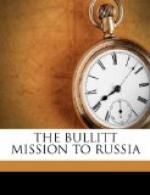revolution in all other countries. His idea
was to collect together all the anti-Bolshevik
parties and help them to make a strong Government,
provided they pledged themselves not to serve
the forces of re-action and especially not to touch
the land question, thereby depriving the Bolshevists
of their strongest argument. Should they
take these pledges, he would be prepared to help
them.
Mr. Lloyd George enquired how this help would be given.
M. Sonnino replied that help would be given with soldiers to a reasonable degree or by supplying arms, food, and money. For instance, Poland asked for weapons and munitions; the Ukraine asked for weapons. All the Allies wanted was to establish a strong Government. The reason that no strong Government at present existed was that no party could risk taking the offensive against Bolshevism without the assistance of the Allies. He would enquire how the parties of order could possibly succeed without the help of the Allies. President Wilson had said that they should put aside all pride in the matter. He would point out that, for Italy and probably for France also, as M. Clemenceau had stated, it was in reality a question of self-defence. He thought that even a partial recognition of the Bolshevists would strengthen their position, and, speaking for himself, he thought that Bolshevism was already a serious danger in his country.
Mr. Lloyd George said he wished to put one or two practical questions to M. Sonnino. The British Empire now had some 15,000 to 20,000 men in Russia. M. de Scavenius had estimated that some 150,000 additional men would be required, in order to keep the anti-Bolshevist Governments from dissolution. And General Franchet d’Esperey also insisted on the necessity of Allied assistance. Now Canada had decided to withdraw her troops, because the Canadian soldiers would not agree to stay and fight against the Russians. Similar trouble had also occurred amongst the other Allied troops. And he felt certain that, if the British tried to send any more troops there, there would be mutiny.
M. Sonnino suggested that volunteers might be called for.
Mr. Lloyd George, continuing, said that it would be impossible to raise 150,000 men in that way. He asked, however, what contributions America, Italy and France would make towards the raising of this Army.
President Wilson and M. Clemenceau each said none.
M. Orlando agreed that
Italy could make no further
contributions.
Mr. Lloyd George said that the Bolshevists had an army of 300,000 men who would, before long, be good soldiers, and to fight them at least 400,000 Russian soldiers would be required. Who would feed, equip and pay them? Would Italy, or America, or France, do so? If they were unable to do that, what would be the good of fighting Bolshevism? It could not be crushed




